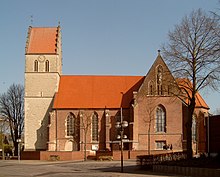St. Andreas (Wüllen)
St. Andreas is a Roman Catholic parish church in Ahaus - Wüllen in the Borken district , North Rhine-Westphalia . Church and congregation belong to the deanery Ahaus in the diocese of Münster . On May 25, 2015 the parish was merged with the parish of St. Martinus (Wessum) to form the parish of St. Andreas and Martinus .
History and architecture
The community was first mentioned as a parish in 1188.
The oldest previous building was a Carolingian hall church , the foundations of which can be traced back to the 9th century. 1976 was a hall church from 11/12. Century. The fortified tower with Gothic stepped gables dates from the 13th century . In the 15th century a two-aisled , centrally divided hall was added to the Romanesque west tower . The transept to the east and the choir with 5/8 conclusion come from 1870. The building was in brick with stone built outline. The tower with corner blocks was made of Bamberg sandstone. Inside, resting Kreuzrippengewölbe on simple capital -less round pillars. In the central yoke of the transept, chalice capitals with hexagon warps support the star vault ; it leads over to the choir with a ribbed vault.
Furnishing
Wooden sculptures of Saints Joseph , Ursula , John the Baptist and Immaculata (Immaculate Conception).
window
In 1976/77 the inside of the church was redesigned. Modern church windows by the well-known glass artist Johannes Schreiter were installed.
Peal
The ringing consists of four bronze bells in the tone sequence d'-es'-f'-b '. The es' bell was cast by Gerhard van Wou in 1496. The bells d 'and f' were cast in 1507 by his pupil Wolter Westerhues . In 2005, Brother Michael from Maria Laach Monastery poured a fourth bell that sounds in the tone b 'and rings the Angelus.
organ
In 1999 the south aisle was redesigned to make room for the new organ at ground level . The case design by Neuendeich's master organ builder G. Christian Lobback was influenced by Schreiter's south window. Contrary to the design practice of Christian Lobback the front was brochure design not three from him, but two-dimensionally applied to the largest possible reflection plane for the south-facing windows by Strider NEVER AGAIN WAR get guided light. The result is a good harmony between the organ architecture and the glass window. The grinding windladen instrument has 27 registers (including 4 registers on a double loop) and 3 auxiliary registers on two manuals and pedal . The game contractures which are mechanically, Registertrakturen electrically.
|
|
|
|||||||||||||||||||||||||||||||||||||||||||||||||||||||||||||||||||||||||||||||||||||||||||||||||||||||||||||||||||||||||||||||||||||||||||||||||||||||||
-
Pairing :
- Normal coupling: II / I (mechanical and electrical), I / P, II / P
- Sub-octave coupling: II / I, II / II
- Super octave coupling: II / P
- Secondary register: Vogelsang (main work), Sonnenton (swell mechanism), percutaneous (percussion mechanism, pedal)
- Playing aids : 128-fold typesetting system , sequencer
- annotation
- D = register on double loop
literature
- Cornelia Kneppe, Uwe Lobbedey: On the older history of St. Andreas in Wüllen: Results of an emergency excavation in 1976. In: Westphalia: Booklets for history, art and folklore. 78. 2000 (2002), pp. 270-285.
- Christian G. Lobback: An organ for the 21st century. In: Kirchengemeinde St. Andreas Wüllen (Ed.): The organ of St. Andreas Wüllen. Pp. 12-15.
Individual evidence
- ↑ Georg Dehio ; Ursula Quednau (scientific director): Handbook of German art monuments. North Rhine-Westphalia. Volume II: Westphalia . Deutscher Kunstverlag, 2011, ISBN 978-3-422-03114-2 , p. 4.
- ↑ More information about the organ of St. Andreas ( Memento of the original of October 13, 2007 in the Internet Archive ) Info: The archive link was inserted automatically and has not yet been checked. Please check the original and archive link according to the instructions and then remove this notice.
Web links
Coordinates: 52 ° 4 ′ 13.4 " N , 6 ° 58 ′ 25.6" E
